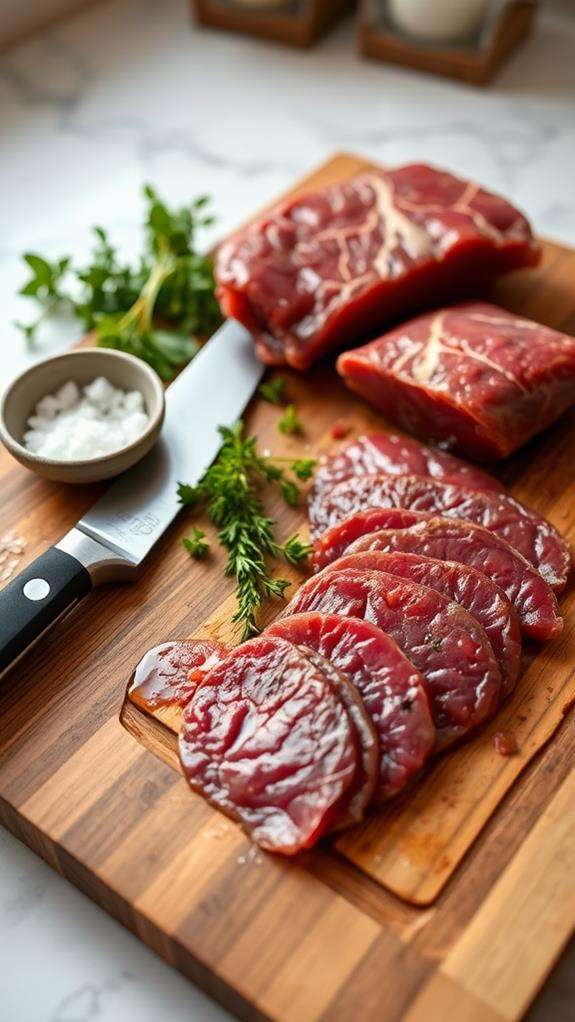Is It Safe to Eat Raw Liver
Eating raw liver isn't safe due to the high risk of foodborne illnesses and parasitic infections. While liver is a nutritional powerhouse packed with essential vitamins and minerals, consuming it raw can expose you to dangerous pathogens like Salmonella, E. coli, and parasites such as liver flukes or tapeworms. These risks far outweigh any potential benefits of raw consumption, such as preserved enzymes or higher nutrient content. To safely enjoy liver's nutritional benefits, it's imperative to cook it thoroughly to an internal temperature of 160°F (71°C). This eliminates harmful organisms while retaining most of its nutritional value. If you're curious about alternative ways to incorporate liver into your diet, there are several safe options to explore.
This post may contain affiliate links. If you make a purchase through these links, I may earn a commission at no additional cost to you. Additionally, portions of this post may be generated using artificial intelligence (AI) technology. While we strive for accuracy, please be aware that AI-generated content may not always be perfect and should be fact-checked when necessary.
The Spatula Scoops
- Eating raw liver poses significant health risks due to potential foodborne pathogens and parasites.
- Raw liver consumption can lead to serious illnesses like salmonellosis, listeriosis, and parasitic infections.
- Cooking liver thoroughly to 160°F (71°C) is essential to eliminate harmful pathogens and parasites.
- While raw liver may retain more nutrients, the health risks outweigh potential nutritional benefits.
- Safe alternatives include properly cooked liver preparations or liver supplements to obtain nutritional benefits.
Nutritional Profile of Liver

Liver is a nutritional powerhouse, packed with essential vitamins and minerals. You'll find it's an excellent source of vitamin A, which supports eye health and immune function. It's also rich in vitamin B12, important for nerve function and red blood cell formation. Iron, a key component for hemoglobin production, is abundant in liver, making it beneficial for those with anemia. Like corn-derived sweeteners, liver is a concentrated source of nutrients, but it offers more health benefits. Its nutrient density makes it an efficient food choice for those looking to maximize their nutritional intake.
Liver contains high levels of copper, essential for collagen formation and energy production. You'll also get a good dose of folate, important for DNA synthesis and cell division. Selenium, a powerful antioxidant, is present in significant amounts. This nutrient helps protect your cells from oxidative stress.
The protein content in liver is impressive, providing all essential amino acids your body needs. It's also a good source of choline, vital for brain function and metabolism. While liver is nutrient-dense, it's crucial to note its high cholesterol content. This may be a concern for those monitoring their cholesterol intake. Additionally, liver contains vitamin K2, which plays a role in bone health and calcium regulation. Understanding these nutritional aspects is important when considering liver consumption, raw or cooked.
Potential Benefits of Raw Consumption
When you consume raw liver, you're potentially preserving more of its nutrients compared to cooked liver. The heat from cooking can destroy some vitamins and minerals, so eating liver raw might allow you to benefit from its full nutritional profile. Raw liver, like organic cacao butter, can be a rich source of healthy fats and essential nutrients, making it suitable for various dietary needs. Additionally, raw liver contains active enzymes that are typically deactivated during the cooking process, which could potentially enhance its digestibility and nutritional absorption in your body.
Nutrient Preservation
While cooking liver can alter its nutritional profile, consuming it raw may preserve certain heat-sensitive nutrients. You'll find that raw liver retains higher levels of vitamin C, B vitamins, and enzymes that can be partially destroyed by heat. These enzymes, like catalase and superoxide dismutase, play vital roles in your body's antioxidant defense system.
Raw liver also maintains its original fat-soluble vitamin content, including vitamins A, D, E, and K. These vitamins are less likely to degrade or leach out during cooking processes. Additionally, the protein structure of raw liver remains intact, potentially making it easier for your body to digest and absorb essential amino acids.
However, it is worth noting that cooking isn't entirely detrimental. Heat can actually increase the bioavailability of some nutrients, like lycopene in tomatoes. In the case of liver, cooking can help break down tough connective tissues, making certain minerals more accessible. The key takeaway is that raw liver preserves some nutrients better, but cooking offers its own benefits. Always consider food safety when deciding between raw and cooked preparations, as raw liver carries a higher risk of foodborne illness.
Enhanced Enzyme Activity
Raw liver's enzyme content offers potential health benefits that cooking may diminish. When you consume raw liver, you're ingesting active enzymes that can aid in digestion and nutrient absorption. These enzymes remain intact, unlike in cooked liver where heat denatures them.
The enhanced enzyme activity in raw liver can lead to several potential benefits:
- Improved digestion of proteins and fats
- Enhanced absorption of fat-soluble vitamins (A, D, E, K)
- Increased bioavailability of minerals like iron and zinc
- Support for your body's natural detoxification processes
You'll find that raw liver's enzymes may complement your body's own digestive enzymes, potentially easing the burden on your pancreas. This could be especially beneficial if you have digestive issues or enzyme deficiencies. Additionally, the unaltered enzymes might help break down toxins more efficiently, supporting your liver's natural detoxification function.
It's important to note that while enhanced enzyme activity is a potential benefit of raw liver consumption, it comes with risks. The decision to eat raw liver should be made carefully, considering both the potential advantages and the safety concerns associated with consuming raw animal products.
Health Risks and Safety Concerns

When considering raw liver consumption, you'll need to be aware of significant health risks. Eating uncooked liver can expose you to foodborne pathogens like Salmonella and E. coli, which can cause severe gastrointestinal issues. Similar to raw rice consumption, uncooked liver may lead to food poisoning and gastrointestinal distress. Additionally, raw liver may harbor parasites such as liver flukes or tapeworms, potentially leading to parasitic infections if consumed without proper preparation.
Foodborne Illness Potential
Despite its nutritional benefits, consuming raw liver comes with significant health risks. The potential for foodborne illness is a major concern when eating any raw meat, including liver. You're exposing yourself to various pathogens that could be present in the uncooked organ.
The most common foodborne illnesses associated with raw liver consumption include:
- Campylobacteriosis
- Salmonellosis
- E. coli infection
- Listeriosis
These bacterial infections can cause severe gastrointestinal symptoms, such as nausea, vomiting, diarrhea, and abdominal pain. In some cases, they may lead to more serious complications, especially for vulnerable populations like pregnant women, young children, the elderly, and those with weakened immune systems.
Raw liver can also harbor parasites, like Toxoplasma gondii, which can cause toxoplasmosis. This infection is particularly hazardous for pregnant women and individuals with compromised immune systems. Additionally, there's a risk of contracting hepatitis E virus, especially from pork liver.
To minimize these risks, it's essential to source your liver from reputable suppliers and handle it with proper food safety practices. However, the safest approach is to cook liver thoroughly before consumption, ensuring that any harmful pathogens are destroyed in the process.
Parasitic Infection Risks
Liver's reputation as a nutrient powerhouse doesn't shield it from harboring dangerous parasites when consumed raw. You're exposing yourself to several risks when eating uncooked liver, including potential infection by parasites like Toxoplasma gondii, Cryptosporidium, and various tapeworms.
These microscopic organisms can cause a range of health issues, from mild gastrointestinal discomfort to severe, life-threatening conditions. For instance, toxoplasmosis, caused by T. gondii, can lead to flu-like symptoms and potentially serious complications for pregnant women or immunocompromised individuals. Cryptosporidium, on the other hand, can cause cryptosporidiosis, a diarrheal disease that can be particularly dangerous for those with weakened immune systems.
Tapeworms, such as Echinococcus granulosus, can establish themselves in your intestines, leading to weight loss, abdominal pain, and in severe cases, organ damage. It bears mentioning that these parasites aren't always detectable by sight or smell, making raw liver consumption a risky endeavor. To minimize these risks, it is strongly recommended that you thoroughly cook liver before consumption, ensuring that any potential parasites are eliminated through proper heat treatment.
Cultural and Historical Perspectives
Cultures around the world have long-standing traditions of consuming raw liver. This practice isn't just a modern culinary trend; it's deeply rooted in history and cultural significance. You'll find that many societies have valued raw liver for its nutritional benefits and perceived medicinal properties.
Throughout history, raw liver consumption has been associated with:
- Strength and crucial importance in warrior cultures
- Fertility and prenatal health in some indigenous communities
- Medicinal treatments for various ailments
- Spiritual and religious rituals in certain belief systems
You might be surprised to learn that ancient Roman gladiators often consumed raw liver before battles, believing it would enhance their performance. In many Arctic cultures, you'll still find people eating raw liver from freshly hunted animals as a way to obtain essential nutrients in harsh environments.
While these cultural practices have persisted, it is crucial to observe that modern food safety standards have evolved. Today's understanding of foodborne illnesses and parasites has led to more cautious approaches in many regions. However, some cultures continue to embrace raw liver consumption, balancing tradition with contemporary health considerations.
Preparation and Handling Precautions

When considering the consumption of raw liver, proper preparation and handling are vital to minimize health risks. You'll need to start with fresh, high-quality liver from a reputable source. Inspect the liver carefully for any discoloration or unusual odors, as these may indicate spoilage or contamination.
Before handling the liver, guarantee you've thoroughly washed your hands and all utensils. Use a clean cutting board designated for raw meats to prevent cross-contamination. It's pivotal to keep the liver refrigerated at 40°F (4°C) or below until you're ready to prepare it.
If you're planning to consume the liver raw, you should freeze it for at least 14 days at -4°F (-20°C) to kill potential parasites. This process, known as "freezing for parasite destruction," is recommended by food safety experts. After thawing, consume the liver immediately and avoid refreezing.
When serving, use clean plates and utensils that haven't come into contact with raw meat. Remember, even with these precautions, consuming raw liver carries inherent risks. It's always safer to cook liver thoroughly to an internal temperature of 160°F (71°C) to eliminate harmful bacteria and parasites.
Alternatives to Raw Liver
For those seeking the nutritional benefits of liver without the risks associated with raw consumption, several alternatives exist. You can opt for cooked liver preparations that retain much of the nutritional value while eliminating potential pathogens. Consider these options:
- Pan-seared liver: Quick cooking over high heat preserves nutrients while killing bacteria
- Liver pâté: A spreadable, cooked preparation that's easy to incorporate into your diet
- Liver pills or supplements: Concentrated forms of liver nutrients in a convenient capsule
- Dehydrated liver powder: A versatile option you can add to smoothies or other foods
You'll find that these alternatives offer a safer way to enjoy liver's benefits. If you're concerned about nutrient loss during cooking, remember that proper preparation methods can minimize this issue. You can also explore different animal sources, such as chicken or lamb liver, which may have milder flavors than beef liver. By choosing these alternatives, you're prioritizing food safety while still reaping the nutritional rewards of this nutrient-dense organ meat. Always consult with a healthcare professional before making significant dietary changes, especially if you have pre-existing health conditions or concerns.
Frequently Asked Questions
Can Pregnant Women Eat Raw Liver?
As a pregnant woman, you shouldn't eat raw liver. It's risky due to potential foodborne illnesses like listeria or toxoplasmosis, which can harm your unborn baby. Raw liver also contains high levels of vitamin A, which can be dangerous in excess during pregnancy. Instead, opt for cooked liver in moderation, as it's still nutrient-dense. Always consult your healthcare provider for personalized advice on your diet during pregnancy. Remember, food safety is vital for both you and your developing child.
How Does Raw Liver Taste Compared to Cooked Liver?
When it comes to taste, raw liver has a distinct flavor profile compared to its cooked counterpart. You'll find raw liver has a more metallic, iron-rich taste with a softer, almost creamy texture. It's often described as more intense and gamey. In contrast, cooked liver tends to have a milder flavor, with a firmer texture and less pronounced iron taste. The cooking process also helps reduce the strong, sometimes off-putting odor associated with raw liver.
Are There Any Religious Restrictions on Consuming Raw Liver?
You'll find that religious restrictions on consuming raw liver vary. In Judaism, for example, it's generally forbidden due to the prohibition on consuming blood. Islam allows liver consumption, but it's typically cooked. Some Christian denominations have no specific restrictions. Buddhist and Hindu practices vary, with some followers avoiding all meat. It bears noting that religious dietary laws often focus on the preparation method rather than the specific organ, so raw consumption may be discouraged in many traditions.
Can Pets Safely Eat Raw Liver?
Feeding raw liver to pets can be safe, but it's not without risks. You should consult your veterinarian before introducing it to your pet's diet. Raw liver can provide valuable nutrients, but it may also contain harmful bacteria or parasites. If you choose to feed raw liver, guarantee it's fresh and from a trusted source. Always practice good hygiene when handling raw meat. For some pets, cooked liver might be a safer alternative while still offering nutritional benefits.
How Long Can Raw Liver Be Stored Before Consumption?
You've just bought some fresh liver, and coincidentally, you're wondering how long it'll keep. Raw liver should be stored in the refrigerator for no more than 1-2 days. If you're not planning to use it immediately, you can freeze it for up to 3-4 months. Always wrap it tightly in plastic wrap or place it in an airtight container before storing. Remember, proper storage is essential to maintain freshness and prevent bacterial growth.
Conclusion
While raw liver offers nutritional benefits, you'll want to weigh the risks carefully. Foodborne illnesses are a real concern, so it's best to err on the side of caution. If you're set on consuming liver, consider lightly cooking it to reduce potential hazards. Alternatively, explore safer options that provide similar nutrients. Remember, your health is paramount, and there are many ways to incorporate liver's benefits into your diet without compromising safety. Always consult a healthcare professional for personalized advice.





